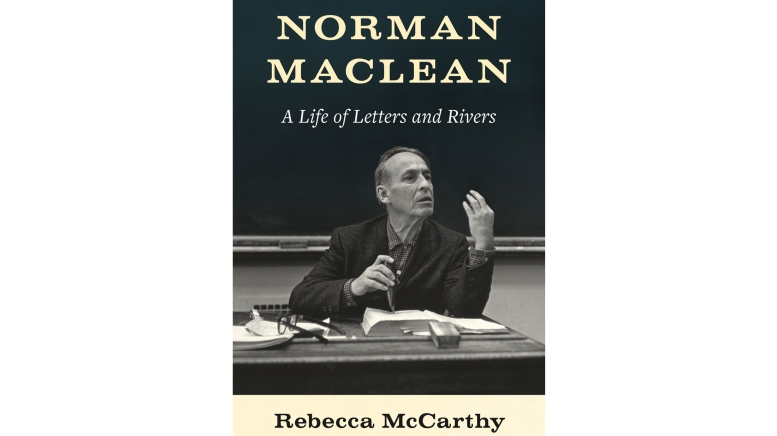When Norman and his father stepped off the train in Hanover, New Hampshire, they found themselves in a small New England village of clapboard buildings and white picket fences. A walk around town confirmed that Hanover was a fraction of the size of Missoula. Where Hanover ended, Dartmouth College began. Its buildings bordered a long, open expanse called “the Green” that had been part of the school for more than 150 years. It was a small, all-male college in an isolated town. The winters were sure to be long, cold, and dark.
A notation in his high school yearbook shows Norman had listed as his college choice Washington and Jefferson, a small liberal arts college south of Pittsburgh founded by Presbyterian missionaries in the late 1700s. But he changed his plans. Norman told me Harvard had accepted him and that he thought about going, but he eventually decided not to, a decision his father seconded. Norman chose Dartmouth, he told his interviewers, because it was “the only outdoor college in the country,” and he assumed the woodsy setting would remind him of Montana. All too soon, he learned he was wrong. In Missoula, which sits at the confluence of five valleys, he had been able to see mountains wherever he went. In Hanover, elms and maples hid the vista. The White Mountains were far away. Most of his father’s family was in Boston, more than an hour south on the train.
At Dartmouth in the 1920s, the majority of students were privileged, white, wealthy young New Englanders. Some of their fathers and grandfathers had attended Dartmouth. They knew little about the Rocky Mountains and less about Montana, other than childhood tales about George Armstrong Custer and history lessons on Lewis and Clark’s expedition. Norman felt they looked down on him because his family wasn’t rich. I later learned that the clubby atmosphere had choked Norman, who told his friend Gwin Kolb that he felt “like an uncouth kid from Montana.” While many of his classmates were learning to sail and play polo, Norman had been fighting forest fires and leading pack mules in the Bitterroot Mountains. And though he spoke and wrote well, he was constantly having to explain himself, his hometown, his lineage, and his reasons for coming to Dartmouth. Doing so had exasperated him.
Even in his later years, Norman failed to resolve his antagonistic attitude toward the affluent. “He had a hatred of big money in the abstract,” said his son-in-law, Joel Snyder. “He could be very difficult, but at the same time, he could be very gracious with wealthy people.” Jessie’s [his wife’s] attitudes were clearer. She had been a fan of the International Workers of the World, the radical Wobblies, and she later became and remained, like Norman, an unreconstructed Roosevelt Democrat.
The most memorable figure in college for Norman was former Dartmouth student Robert Frost, then in his late forties. The poet was an occasional teacher at the college and had a free hand in instructing his students. Norman said Frost “talked straight to you, and often poetry was there, or something close to it.” Classes met once a week, in the evening, in a “great big basement room with a wonderful fireplace.” The subject was creative writing, but Frost apparently never bothered to read his students’ papers. Instead, he would pace back and forth in front of the class, talking and talking. There were never any questions in Frost’s classes, Norman said, and “nobody ever stopped him.”
Norman studied hard, later claiming he read a book a day, but he realized he would have to suppress his sardonic sense of humor in class. He became a C student—an accomplishment, given his meager high school education and his many extracurricular activities. He found ways to thrive outside the classroom. He joined Beta Theta Pi and promptly began relieving his fraternity brothers of their money around the poker table. A friend visiting from Montana was astounded that the college boys “didn’t know not to draw from an inside straight.” In a local gym, Norman boxed with fraternity members and men from the community and enjoyed knocking down opponents. He became a staff member of the Dartmouth Bema, a literary magazine, and the Aegis, the Dartmouth yearbook. He was selected for Sphinx, the oldest of Dartmouth’s many secret societies. He was on the board of governors for The Arts, “a clearing house for the ideas and opinions of those interested in the fields of literature, drama and music.” Among the writers coming to campus during his senior year were journalist and critic Rebecca West and poet Edna St. Vincent Millay. How he felt about meeting and hearing these women, we don’t know, but I do know he liked Millay’s poetry.
Of all his undergraduate extracurricular activities, Norman most valued his time with the Dartmouth Jack-O-Lantern, a monthly campus humor magazine. He served as editor-in-chief his last year of college, earning sixteen hundred dollars during the academic year. It was the perfect outlet for him, surrounded by other young men who also appreciated wit and sarcasm. Under his tenure, the Jacko was more popular than ever before and was even distributed on other college campuses. It offered jokes and mocking editorials on such topics as the poor quality of the campus newspaper, The Dartmouth (“Jacko wishes to congratulate the advertising manager of The Dartmouth for the fine issues he is putting out”) and the injustice of compulsory chapel (“Christianity vs. chapel: Ye are the salt of the earth: but if the salt have lost its savor, wherewith shall it be salted? It is thenceforth good for nothing, but to be cast out, and to be trodden under the foot of man”).
Another bright spot was his friendship with Theodor Seuss “Ted” Geisel, known today as Dr. Seuss. They had worked together on the Jack-O-Lantern. According to Geisel, he and Norman often wrote “practically the whole thing” by themselves, tag teaming the task. “Hunched behind his typewriter, [Norman] would bang out a line of words,” Geisel said. “Sometimes he’d tell me what he’d written, sometimes not. But, then, he’d always say, ‘The next line’s yours.’ And, always, I’d supply it. This may have made for rough reading. But it was great sport writing.” Geisel later said his big desire had been to run the magazine in his senior year, saying, “If Mac hadn’t picked me as his successor, my whole life at college would have been a failure.” Unlike Norman, who eventually thawed about his alma mater, Geisel always had warm feelings for Dartmouth and became its biggest benefactor.
Before Norman graduated, in June 1924, Dartmouth English professor David Lambuth asked if he wanted to return to campus and teach freshman composition. Lambuth had had Norman in a few of his classes and was impressed with his writing ability and his sensitivity to language. Norman accepted the offer, telling an interviewer the class “was full of some poker buddies of mine, and I figured it would be a good way to pay back some debts.”
Norman went home to Montana to work for the U.S. Forest Service, gathering some of the experiences he would later turn into stories. He had spent most summers working for the Forest Service, except for part of 1921, when his father, Paul, and he worked on a log cabin on the shore of Seeley Lake, on land leased to them by the federal government. Norman returned to the halls of Hanover in the autumn of 1924 as an instructor of introductory English, and his brother, Paul, went with him to start on his Dartmouth degree.
Excerpted from Norman Maclean: A Life of Letters and Rivers by Rebecca McCarthy and reprinted with permission from the University of Washington Press. Copyright © 2024 Rebecca McCarthy.


